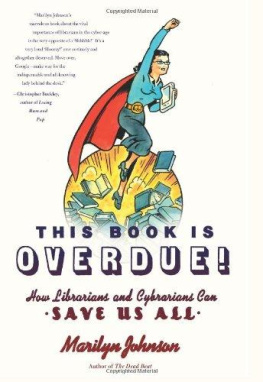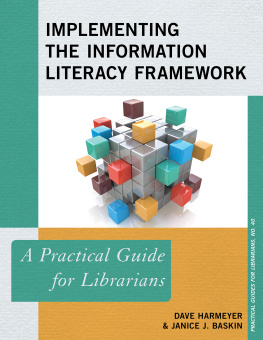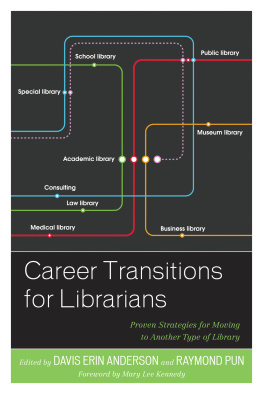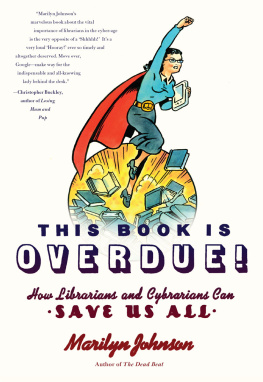Show me a computer expert who gives a damn, and Ill show you a librarian.
In tough times, a librarian is a terrible thing to waste.
Down the street from the library in Deadwood, South Dakota, the peace is shattered several times a day by the noise of gunfirejust noise. The guns shoot blanks, part of an historic re-creation to entertain the tourists. Deadwood is a far tamer town than it used to be, and it has been for a good long while. Its library, that emblem of civilization, is already more than a hundred years old, a Carnegie brick structure, small and dignified, with pillars outside and neat wainscoting in. The library director is Jeanette Moodie, a brisk mom in her early forties who earned her professional degree online. Shes gathering stray wineglasses from the previous nights reception for readers and authors, in town for the South Dakota Festival of the Book. Moodie points out the portraits of her predecessors that hang in the front room. The first director started this library for her literary ladies club in 1895, not long after the period that gives the modern town its flavor; she looks like a proper lady, hair piled on her head, tight bodice, a choker around her neck. Moodie is a relative blur. She runs the library and its website, purchases and catalogs the items in its collections, keeps the doors open more than forty hours a week, and hosts programs like the party, all with only part-time help. When she retires, shell put on one of her neat suits, gold earrings, and rectangular glasses and sit still long enough to be captured for a portrait of her own.
Moodie is also the guardian of a goldmine, the history of a town that relies on history for its identity. She oversees an archive of rare books and genealogical records, which, when theyre not being read under her supervision, are kept locked up in the South Dakota Room of the library. Stored in a vault off the childrens reading room downstairs are complete sets of local newspapers dating back to 1876 that document Deadwoods colorful past in real time. A warning on the library website puts their contents in a modern context: remember that political correctness did not exist in 19th-century Deadwoodmany terms used [negro minstrelcy, for instance, and good injun] are now considered derogatory or slanderous, but are a true reflection of our history.
If you want a gauge of how important this archive is to Deadwood, Moodie will take you into the vault, a virtually impregnable room lined with concrete and secured by a heavy steel door. No fire or earthquake or thief is going to get at the good stuff inside this place. A dehumidifier hums by the door. Newsprint and sepia photos, stored in acid-free, carefully labeled archival boxes, are stacked neatly on shelves around a big worktable. In her spare time, the librarian comes down here to browse the old articles that a consultant has been indexing, systematically listing the subjects and titles of each story for the librarys electronic catalog. The towns past lives on in this catalog, linked with all the other libraries in South Dakota. Anyone can log on as a guest, consult the librarys index online, and learn that the Black Hills Daily Times published a story in 1882 called Why Do We Not Have Library & Reading Rooms? and three years later, Reading Room and Library Almost Complete, alongside stories like Accidental Shooting Part of a Free for All and Cowboys Shoot Up Resort.
Moodie, like her predecessor a century ago, is essentially organizing the past and making it available to the citizenry, but shes doing so in ways that the librarian of the late 1800s could never have imagined, preserving images of one frontier with the tools of another. What would the proper lady in the portrait make of the current librarians tasks, the maintenance of the website, for instance, with its ghostly and omniscient reach?
Theres another Deadwood library on the digital frontier. This one doesnt resemble the elegant Carnegie building in the real town in South Dakotait looks instead like a crude wooden storefrontbut it, too, evokes the period that characterizes Deadwood, the late 1800s, the gold rush, and the Wild West. The difference is that this library exists solely on the Internet in the virtual world known as Second Life. People at computers around the globe, taking the form of avatars dressed in chaps and boots or long prairie dresses and playing the roles of prospectors, saloon keepers, and ordinary citizens, can visit the library in an historic reenactment of Deadwood in Second Life. They can enter this ramshackle building and, by typing questions in a chat box, ask the librarian what sort of outfit a prostitute would have worn, or where to find information on panning for gold. Or they can browse the collection the librarian has gathered in the form of links to dime novels and other old-time books, available in digital form from sites like Project Gutenberg and the Internet Archive.
The librarian, Lena Kjellar, shows up onscreen as a cartoon woman in a bustle skirt. The person behind this avatar was trained to provide Second Life reference services by a real-life reference librarian and is part of an information network anchored by hundreds of professional librarians who flock to this interactive site for fun and stay to volunteer their skillsthey figure everyone should be able to use library services, even avatars. In fact, Lena Kjellar is a retired electrical engineer and locomotive buff from Illinois named Dave Mewhinney; he feels that taking on a womans shape in Second Life makes him more approachable.
Somewhere between Jeanette Moodies frontiers and Lena Kjellars is the story of a profession in the midst of an occasionally mind-blowing transition. A library is a place to go for a reality check, a bracing dose of literature, or a true reflection of our history, whether its a brick-and-mortar building constructed a century ago or a fanciful arrangement of computer codes. The librarian is the organizer, the animating spirit behind it, and the navigator. Her job is to create order out of the confusion of the past, even as she enables us to blast into the future.
I became interested in librarians while researching my first book, about obituaries. With the exception of a few showy eccentrics, like the former soldier in Hitlers army who had a sex change and took up professional whistling, the most engaging obit subjects were librarians. An obituary of a librarian could be about anything under the sun, a woman with a phenomenal memory, who recalled the books her aging patrons read as childrenand was also, incidentally, the best sailor on her stretch of the Maine coastor a man obsessed with maps, who helped automate the Library of Congresss map catalog and paved the way for wonders like Google Maps.
There were visionaries like Frederick Kilgour, the first to combine libraries catalogs in one computerized database back in the early seventies. This was a great act in the history of knowledgeits efficient and useful multiplication. Under Kilgours direction, what began as a few dozen college libraries in Ohio sharing their catalogs soon snowballed into a world catalog, the Online Computer Library Center. Now anyone can go to WorldCat.org, the OCLCs catalog of a gazillion library records, and find many libraries that carry the item you need; WorldCat has made every computer a portal to institutions from the Library of Congress to the Tauranga (New Zealand) District Library. Kilgour lived to the age of ninety-two and taught till he was ninety. His obituarist noted that during World War II, like many librarians[he] gravitated into intelligence work. Good librarians are natural intelligence operatives. They possess all of the skills and characteristics required for that work: curiosity, wide-ranging knowledge, good memories, organizational and analytical aptitude, and discretion.










